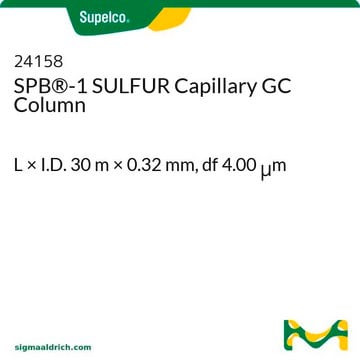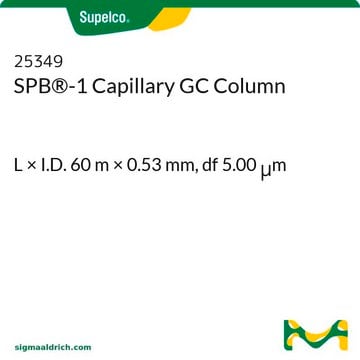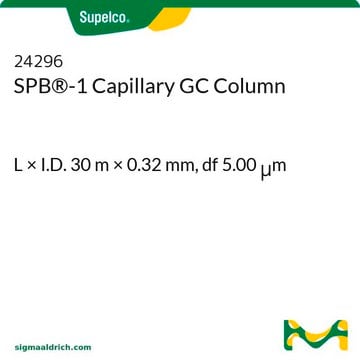24028
SPB®-1 Capillary GC Column
L × I.D. 30 m × 0.25 mm, df 0.25 μm
Sign Into View Organizational & Contract Pricing
All Photos(1)
About This Item
UNSPSC Code:
41115710
eCl@ss:
32119290
Recommended Products
material
fused silica
Agency
meets requirements for USP G1, G2, and G9
parameter
-60-320 °C temperature (isothermal or programmed)
Beta value
250
df
0.25 μm
technique(s)
gas chromatography (GC): suitable
L × I.D.
30 m × 0.25 mm
matrix active group
Bonded; poly(dimethyl siloxane) phase
column type
capillary non-polar
Looking for similar products? Visit Product Comparison Guide
General description
Application: This column is often used for traditional general purpose applications, where a non-polar column is required. Analytes will be separated primarily according to boiling point.
USP Code: This column meets USP G1, G2, and G9 requirements.
Phase:
USP Code: This column meets USP G1, G2, and G9 requirements.
Phase:
- Bonded
- Poly(dimethyl siloxane)
- ≤0.32 mm I.D., <2 μm: -60 °C to 320 °C (isothermal or programmed)
- ≤0.32 mm I.D., ≥2 μm: -60 °C to 300 °C (isothermal or programmed)
- ≥0.53 mm I.D., <2 μm: -60 °C to 300 °C (isothermal) or 320 °C (programmed)
- ≥0.53 mm I.D., ≥2 μm: -60 °C to 260 °C (isothermal) or 280 °C (programmed)
Application
SPB®-1 Capillary GC Column was used for speciation of the nitrogen compounds (quantitatively), which are polar and somewhat basic in nature, with chemiluminescence detection.
Other Notes
We offer a variety of chromatography accessories including analytical syringes
Legal Information
SPB is a registered trademark of Merck KGaA, Darmstadt, Germany
Storage Class Code
10 - Combustible liquids
WGK
WGK 1
Flash Point(F)
214.0 °F - closed cup
Flash Point(C)
101.1 °C - closed cup
Choose from one of the most recent versions:
Already Own This Product?
Find documentation for the products that you have recently purchased in the Document Library.
Customers Also Viewed
H Seno et al.
Forensic science international, 50(2), 239-253 (1991-09-01)
The positive ion electron impact (PIEI), positive ion chemical ionization (PICI) and negative ion chemical ionization (NICI) mass spectra and a rapid isolation procedure using Sep-Pak C18 cartridges are presented for ten local anaesthetics. In the PIEI mode, molecular peaks
K Shindo et al.
Drugs under experimental and clinical research, 17(7), 343-349 (1991-01-01)
To confirm that platelet activating factor (PAF) plays an important role as a mediator in acute inflammation and allergic reaction, it is necessary to develop a more sensitive and stable method for measuring trace amounts of PAF in various biological
A M Roccamo et al.
The European journal of neuroscience, 11(5), 1615-1623 (1999-04-24)
The properties of the nicotinic acetylcholine receptor (AChR) are modulated by its lipid microenvironment. Studies of such modulation are hampered by the cell's homeostatic mechanisms that impede sustained modification of membrane lipid composition. We have devised a novel strategy to
Ilme Liblikas et al.
Chemistry & biodiversity, 6(9), 1388-1403 (2009-09-24)
The four possible isomers of tetradeca-4,8-dien-1-yl acetate and corresponding alcohols were synthesized stereoselectively by synthetic routes employing Wittig coupling reaction for the preparation of (Z,E)- and (Z,Z)-isomers, and alkylation of terminal alkynes for the preparation of (E,E)- and (E,Z)-isomers as
P J Streete et al.
The Analyst, 117(7), 1111-1127 (1992-07-01)
Headspace gas chromatography with split flame-ionization-electron-capture detection is a simple method of screening for a wide range of volatile substances in biological fluids. A 60 m x 0.53 mm i.d. thick-film (5 microns) fused-silica capillary coated with SPB-1 (Supelchem) with
Our team of scientists has experience in all areas of research including Life Science, Material Science, Chemical Synthesis, Chromatography, Analytical and many others.
Contact Technical Service






